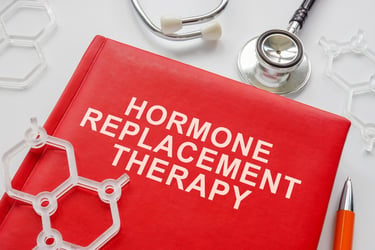Hormone Replacement


Part of the normal aging process for men includes a decline in testosterone. Levels typically peak during adolescence and early adulthood and can begin to decline slowly around age 40. Decreased testosterone levels may be from the natural aging process or as a result of a condition affecting hormone production. Testosterone is the male hormone primarily responsible for masculine features including:
Muscle strength and mass
Fat distribution
Bone density
Facial and body hair
Production of Red blood cells.
Energy levels
Sex Drive
Sperm production
Patients of all adult ages may experience symptoms of a decline in testosterone or a condition known as hypogonadism. Hypogonadism is a condition in which the testicles or pituitary glands no longer function properly to produce normal levels of hormones. Symptoms include:
Decreased sexual function. This may include a reduction in sexual desire, fewer spontaneous/nocturnal erections, and infertility.
Poor sleep patterns. Patients may have trouble sleeping, insomnia or other sleep disturbances or overall decreased energy and excessive fatigue during the day.
Physical changes. Various physical changes include an increase in body fat, reduced muscle mass and strength, and decreased bone density.
Emotional changes. Low testosterone may contribute to a decrease in motivation or self-confidence. You may feel sad or depressed, or have trouble concentrating or remembering things with an overall foggy mind.
Therapy for this condition is available to improve the side effects of the disease and is often offered in the form of gels, injectable oils, and implantable pellets to optimize hormonal levels for enhanced quality of life.




